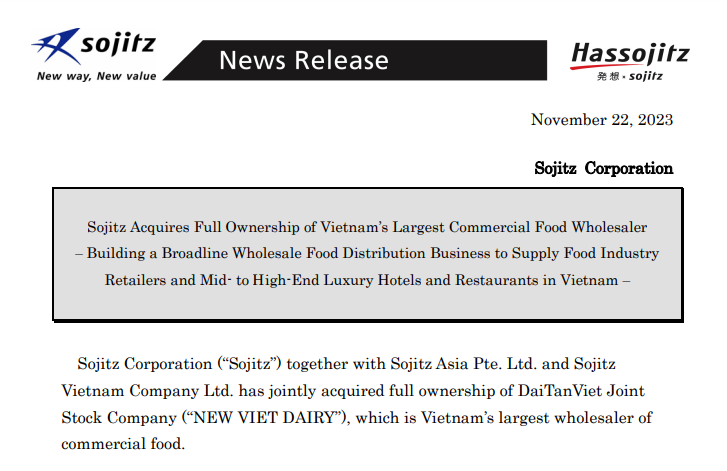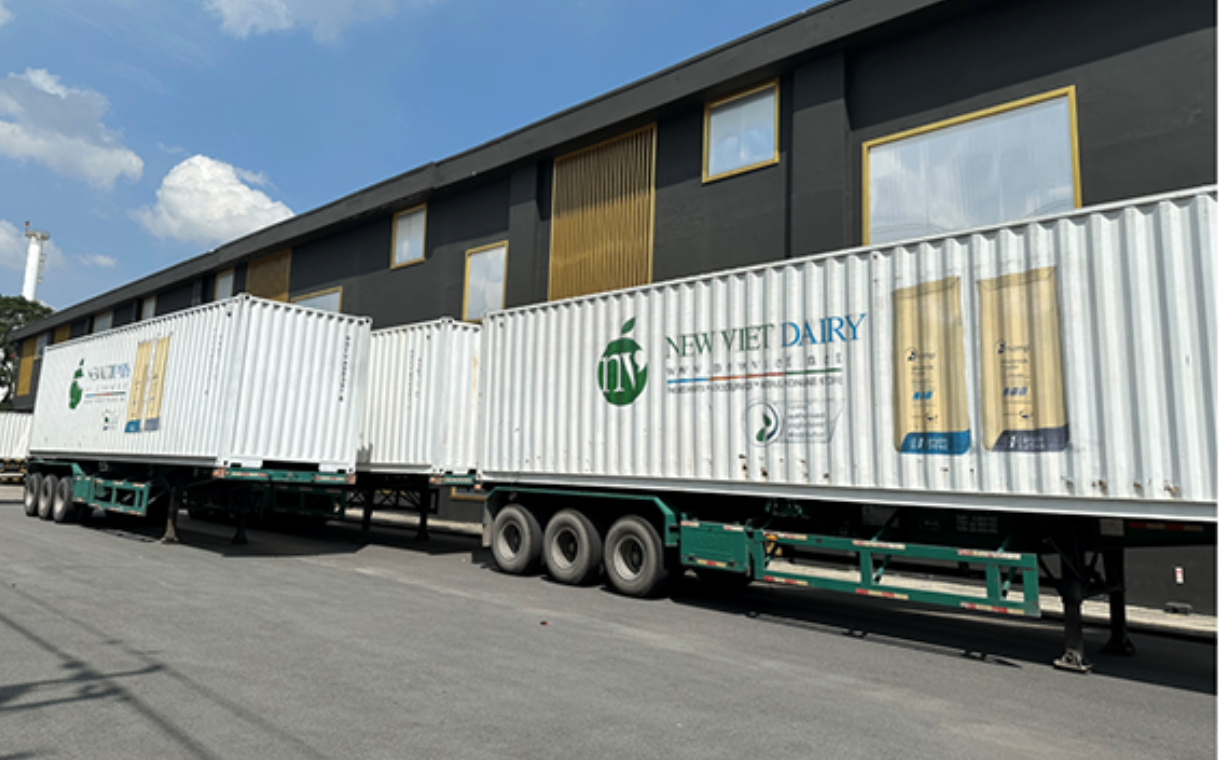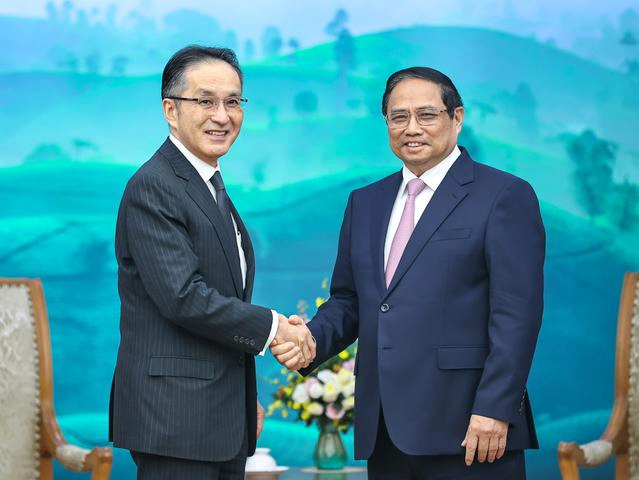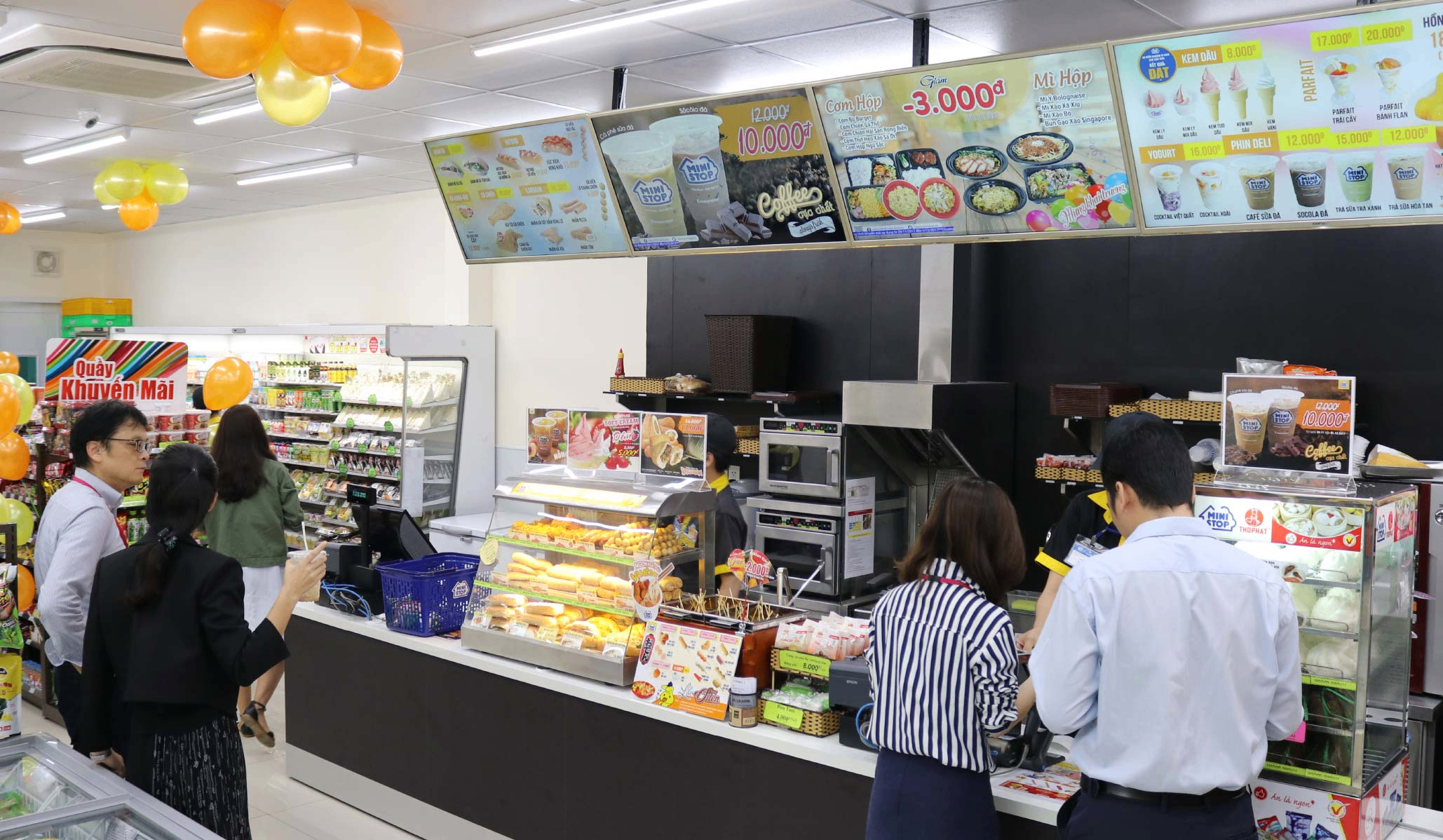Double-day acquisition of Vietnam's largest food wholesaler upstream and downstream food channels have been opened.
At a time when multinational companies are pouring into Vietnam's food distribution industry, Japan's Sojitz Co., Ltd. (Sojitz) has acquired Vietnam's largest food wholesaler, promoting the modernization of both sides "win-win"。
Sojitz has acquired a full stake in Dai Tan Viet, Vietnam's largest commercial food wholesaler, joining a wave of multinational investment in the Vietnamese market to modernize and grow.。

Open up the upstream and downstream double-day financial road?
It is understood that New Viet Dairy is a wholesale importer and distributor, covering three areas of commercial food, catering services and dairy raw materials.。In 2022, the company's annual sales totaled about 37 billion yen (about 2.$500 million)。The company is also the only food importer in Vietnam that has been approved and certified under the "Authorized Economic Operator" program, and has a mature safety management and legal compliance system to speed up customs clearance procedures.。
As demand for offline dining and takeaway services continues to grow, Vietnam's catering industry is expected to usher in a positive dawn。New Viet Dairy's commercial food and catering services business provides a total of about 2,000 products to the company's nearly 6,000 mid-to-high-end luxury hotels and restaurants, and has about 100 suppliers in Vietnam and overseas.。
In addition, New Viet Dairy is one of the country's largest processors of beef, cheese and other foods, meeting the needs of a diverse food culture and selling them nationwide under the brand name "Bottega Zelachi."。
With the increase of middle-class consumers, Vietnam's dairy market is expected to grow to about $8.4 billion, with an average annual growth rate of more than 8%。New Viet Dairy imports dairy ingredients from Fonterra, New Zealand's largest dairy producer, providing milk powder and other products to dairy producers。The company has earned a strong reputation for meeting customer needs with fast delivery and small-volume orders, resulting in sales of 40% of the market share, ranking first in the industry.。
Through the acquisition, Sojitz will partner with Huong Thuy (HT) to supply independent retail stores, hypermarkets and mid- to high-end hotels and restaurants; and leverage New Viet Dairy and HT's customer network to expand its sales channels in Vietnam to promote seafood products and other business partnerships.。
In addition, given Dai Tan Viet's strong presence not only in imported food but also in food processing facilities, Sojitz's existing consumer goods wholesale business in Vietnam will create synergies with the company's customer base and products, strengthening its value chain in Vietnam.。
Sojitz has partnered with Vinamilk, Vietnam's largest dairy producer, to set up a Japanese-style ranch and beef processing park with a total investment of up to $500 million.。Sojitz also helped it open a Ministop convenience store in Vietnam。
Through these acquisitions and partnerships, Sojitz has opened up upstream and downstream food distribution channels in Vietnam, "said Sojitz Chief Financial Officer Makoto Shibuya.。"

Why Vietnam's modern trade takes off under the heat wave?
Today, many foreign companies are moving into Vietnam's food distribution industry。
Marubeni Corporation has acquired a stake in Asia Ingredients Group (AIG), a major food ingredient supplier in Vietnam, supplying more than 1,500 food products to more than 1,200 corporate customers.。Marubeni is also a shareholder in the Vietnamese subsidiary of Acecook, a Japanese instant noodle maker。
Semmaris, a French market management company, has spent about $300 million to develop a one-million-square-meter wholesale agricultural product market in Garin County, outside the Vietnamese capital Hanoi.。The market will be divided into five parts, each of which independently provides one type of product, such as vegetables, meat or seafood, to distinguish it from other modern equipment such as refrigeration。
Not to be left behind in the cold chain industry, Vietnam's Tan Bao An Logistics Company, in cooperation with Japanese frozen food seller Nichirei, will build a cold storage in Long An Province near Ho Chi Minh City by March 2025.。At the same time, Yokorei (Yokorei) and the province's cold storage construction has also started。
During a meeting with Prime Minister Pham Minh Chinh on November 13, Marubeni President and CEO Masumi Kakinoki said: "Vietnam has always been an important market in Asia.。"

Indeed, although Vietnam's food distribution network has not yet fully developed, it has been one of Sojitz's most important markets in recent years, and business opportunities are expected to expand further as the country's economy grows.。In recent years, Sojitz has built a value chain of manufacturing, logistics and retail in Vietnam to meet the rapid expansion of modern retail formats such as supermarkets and convenience stores.。
It is estimated that Vietnam's population will exceed 100 million this year, ranking third in Southeast Asia, with a GDP of over $4,000 in 2022.。As a middle-income country, Vietnam's consumer spending is accelerating overall。Vietnam's retail market totaled 420 billion VND ($174 billion) in 2022, growing by more than 10 percent each year over the past decade.。
But the modernization of the country's food distribution network has lagged behind the fast-growing economy.。The survey shows that in advanced countries such as Japan and South Korea, modern trade accounts for 80% -90% of the market, Thailand's modern trade market share is 50%, and Indonesia's is about 30%.。
Modern trade refers to structured enterprises with temperature control and health management functions, which account for only about 10 per cent of the market, while development is particularly slow in northern and central Vietnam.。In Hanoi, open-air stalls selling meat and fish on both sides of alleys are everywhere, and traditional markets still dominate。Therefore, how to attract shoppers from traditional markets is the biggest problem facing Vietnam。

Modernized food distribution network will create more room for retail chains。Vietnam expects to lift some expansion restrictions on foreign chains next year, offering policy dividends for modern trade。
Hong Kong-based Jinyuan Development International Industries, which operates Circle K convenience stores in Vietnam, plans to expand its network by about 20 percent to 500 by the end of next year.。The GS25 chain, operated by South Korea's GS Retail, is also growing rapidly and now has more than 200 stores.。As of the end of fiscal year 2022, Ministop has 138 stores in Vietnam and is expected to reach 500 in fiscal year 2025.。
In the supermarket sector, Vietnamese developer BRG Group has partnered with Sumitomo to extend FujiMart offline stores to Hanoi.。Aeon, Japan's largest retailer, has positioned Vietnam as its most important overseas market and plans to open its first shopping mall in central Vietnam in Hue province as early as next year.。
During the neo-crown epidemic, e-commerce has sprung up in Vietnam, followed by a demand for digital capabilities.。The development of online trade will expand the scale of online shopping for fresh food, and efficient distribution systems and the integration of "digital + physical" have long been the key to success for businesses.。
·Original
Disclaimer: The views in this article are from the original Creator and do not represent the views or position of Hawk Insight. The content of the article is for reference, communication and learning only, and does not constitute investment advice. If it involves copyright issues, please contact us for deletion.